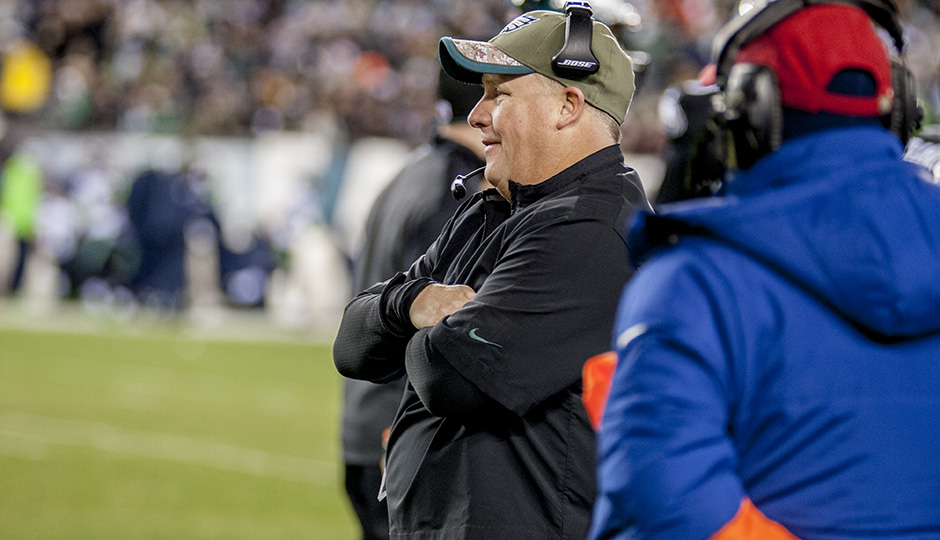Changeup: Eagles Facing More Zone Than Man
During the offseason, figuring out ways to beat man coverage seemed like an obsession for Chip Kelly.
He saw how teams played the Eagles in his first season. They singled up receivers and used one high safety all season long. They needed the second safety in the box to help against LeSean McCoy and the Eagles’ prolific rushing attack. And playing man coverage was a simple solution to dealing with tempo.
Whenever the Eagles made an offseason move on offense – releasing DeSean Jackson, trading for Darren Sproles, re-signing Jeremy Maclin and Riley Cooper, drafting Jordan Matthews and Josh Huff – Kelly noted the need for his receivers to be able to beat man coverage.
But there have been changes in Year 2. Most notably, teams have felt comfortable playing more zone. But why has that been the case?
“Well, last year we set an NFL record for explosive plays,” Kelly said. “So I didn’t think anybody thought they would play us the same way. So usually if the ball is getting thrown over your head, I think people are going to back up more.”
Added offensive coordinator Pat Shurmur: “Sometimes they don’t really feel great about their matchups maybe, so they just play a nice zone. Teams that like to play man will do it regardless. And then I think some of it comes down to who the teams are that you’re playing.”
Kelly came armed with numbers the day he was asked about man vs. zone. He said the Eagles saw 60 percent man, 40 percent zone last year. This year, it’s nearly flipped – 42 percent man, 58 percent zone.
Teams still play the Eagles with a single high safety – 79 percent of the time last year, 78 percent this year, per Kelly – but in 2014, that means more Cover 3, a zone coverage with man principles that teams like the Seahawks use often.
“I know that last year… it’s a lot easier to get lined up and play when it’s man to man coverage,” said Jason Kelce. “So I think that was one of the reasons we saw it so much last year is that teams were a little bit skeptical, and they just wanted to line up and make sure that they had everybody accounted for and be ready for the tempo offense. This year, I don’t know if it’s because there’s more film on us or whatever, but we’ve certainly seen more zone coverage.”
Last year, in addition to the prolific rushing attack, the Eagles killed opponents with downfield throws. They led the NFL with 80 pass plays of 20+ yards. This year, they are on pace for 64, which in all fairness, would still rank tied for second.
There have been plenty of changes – no Jackson, a banged-up offensive line, inconsistent QB play and so on. Cooper, who’s YPR average has dipped from 17.8 to 10.2, believes the changeup on defense has had a lot to do with the fewer big plays.
“Last year, we got man to man, single high safety every single game,” Cooper said. “Teams are playing us a little bit different this year. We’re getting majority zone. That’s what we’re getting. So it’s tough to kind of get past that for the deep balls in the zone throws. Those deep balls, teams are taking away. So we’ve gotta come at ’em a little differently, dink and dunk and get the run game going.
“I just think we had so much success last year getting singled, DeSean and myself. They just played single high, and Shady was having such a fantastic year that they had to have somebody in the box. So I think they’re just trying to switch it up, and we’re getting predominantly zone.”
Last year, teams often changed how they played when they faced the Eagles. That has happened as much this year, and when it does, Kelly considers it a win because scheme doesn’t always match personnel.
“The last time we played the Dallas Cowboys, they were 61 percent zone going into the game, but they played us in the game 55 percent man,” Kelly said. “So they played us a little bit more man than they had shown during the year, but it was still a 55‑45 split.”
While beating man coverage is still important to Kelly and the Eagles, 2014 has been a different year than 2013. The Eagles rank 16th in DVOA and have turned it over on 17.6 percent of their drives (31st), per Football Outsiders. In 2013, those rankings were third (both categories).
The Eagles still have three regular season games with great significance, but it’ll be interesting to see how the man/zone switch-up affects some of their offseason decisions on the offensive side of the ball.
